Springtime on the homestead means more daylight, and happier chickens. Happier chickens make more eggs, and thus, we have an overabundance to deal with. In order to have plenty in the fall and winter months, water glassing eggs is the perfect solution.
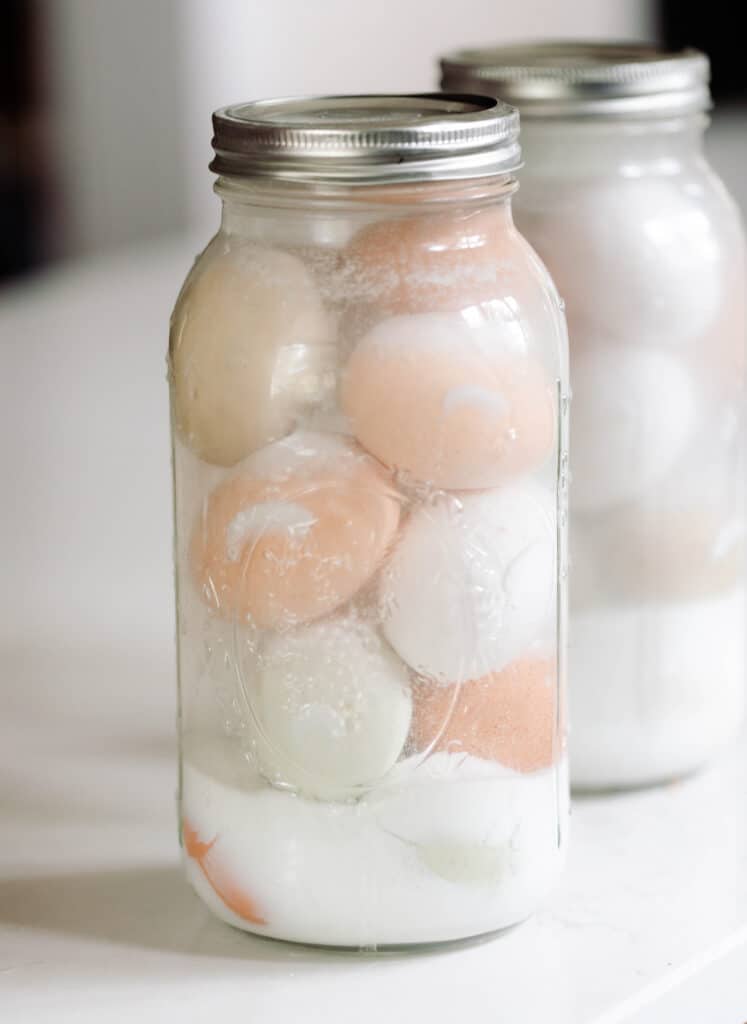
What is Water glassing Eggs?
Water glassing eggs involves submerging clean, unwashed, eggs in a pickling lime and water solution to seal off the shell and preserve them for 12-18 months. The result is perfectly fresh, unspoiled eggs, just like they were the day the hen laid them. Sometimes properly water glassed eggs are still fresh even after two years. Homestead folks have been using this preservation method since the 1800s to capitalize on the springtime egg abundance year round.
There are a few different solutions that work for water glassing, such as sodium silicate and water, but today I am going to share a method for using hydrated lime, which is also known as pickling lime.
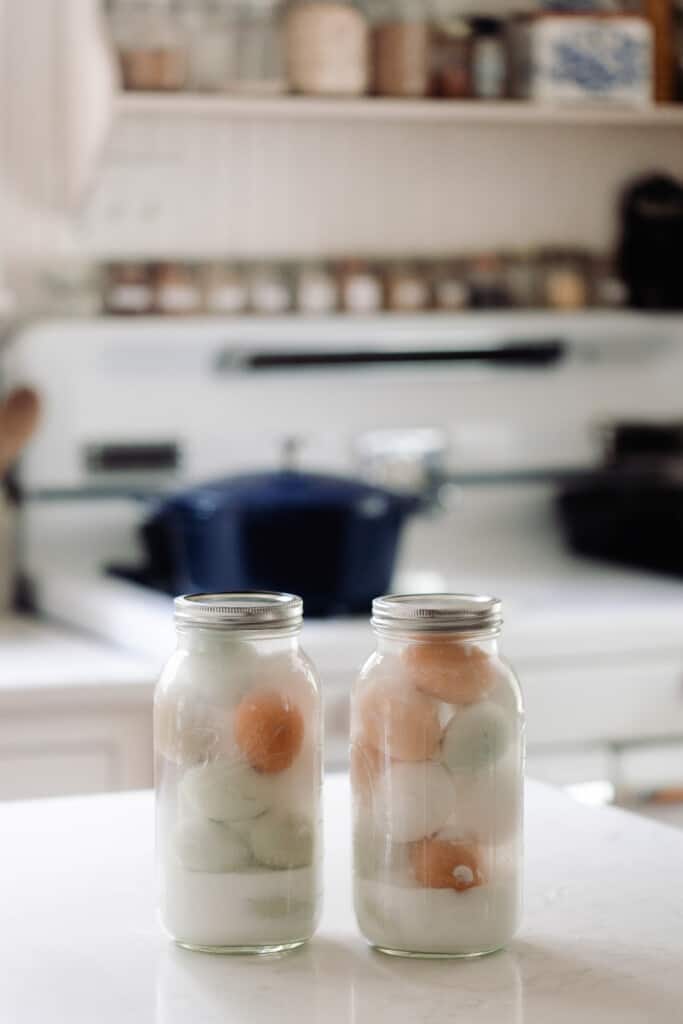
Tips:
You can fit approximately 16-18 eggs per half gallon jar.
Use your cleanest eggs for water glassing. I usually set aside the spotless ones and wait to water glass until I have enough of them. We wash the really dirty ones and store them in the refrigerator. If we keep up with cleaning the coop, and adding fresh straw or bedding, we have a lot more water glass candidates.
If you don’t have a water filter, and you only have access to chlorinated water, you can leave an open jar of water out on the counter for 24 hours. This will cause the chlorine to evaporate.
Use an airtight vessel. Oxygen is the enemy of nearly all food preservation methods, and water glassing is no exception!
Use 1 ounce of pickling lime per quart of water. You can do this in any quantity. So if you have 50 dozen eggs, get yourself some big old food grade buckets and whole lot of lime!
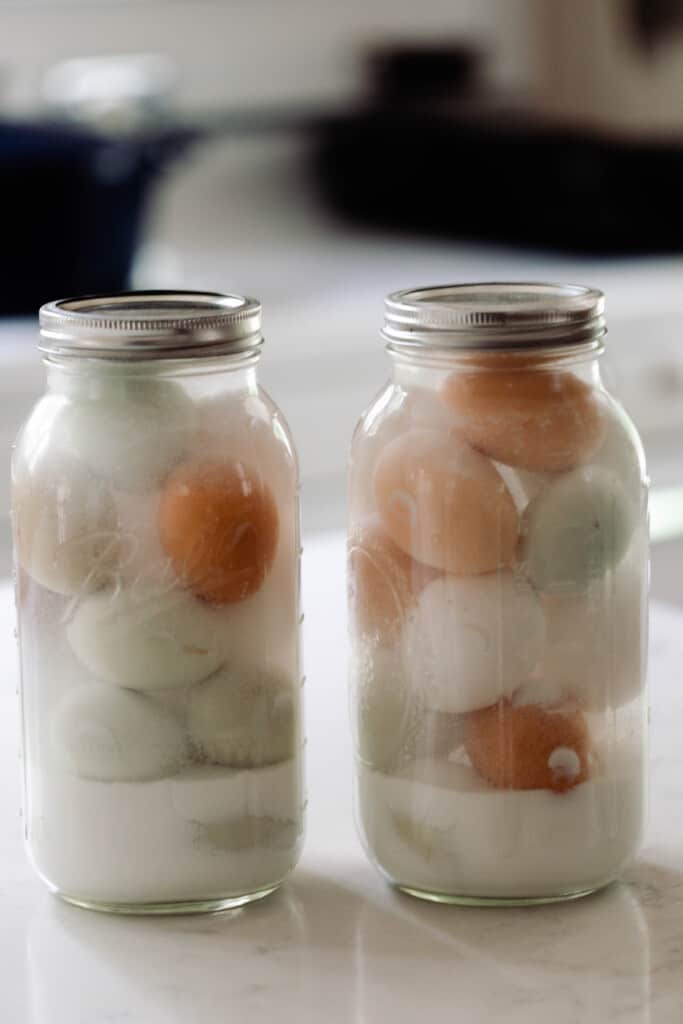
FAQ
Why should you preserve eggs?
We don’t usually think of eggs as a seasonal food, but they actually are. A hen’s ovulation coincides with the length of the day. In the winter, when the daylight hours are short, hens lay little to no eggs. Chickens reach their peak egg laying production when the daylight hours are longest. Heat can also affect ovulation, so springtime, between April and June, yields the highest egg volume here on our homestead. In order to avoid buying several dozen eggs a week in the middle of winter, it makes sense to preserve them when production is up.
Can you water glass store bought eggs?
Unfortunately, no, you cannot water glass store bought eggs. When hens lay eggs, they are covered with a protective “bloom” to keep the eggs fresher longer. This is the reason you can find a pile of eggs hidden somewhere on your homestead after a few weeks, and they are still perfectly fresh and edible. Eggs from the grocery store have been thoroughly cleaned and sanitized, so the bloom is no longer in tact. The lime solution in water glassing works with the bloom to preserve the eggs, so sanitized eggs are a definitee no-go for this method. Try freezing the eggs instead.
Can you use tap water to water glass eggs?
Avoid chlorinated and fluorinated water when water glassing eggs. Ideally you would have access to filtered water that still has all of the minerals intact. If you are on a well, tap water will work just fine. If you are on city water with chlorine and fluoride, opt for a filter, such as the Berkey Water Filter for water glassing eggs.
Can you boil water glass eggs?
You can hard boil eggs that have been water glassed, but it is important to note that you should first poke a small hole in the shell. The hydrated lime solution works by sealing off the egg, and filling all of the pores of the eggshell, so it could actually explode if you don’t first create a release for the pressure.
What is hydrated lime?
Hydrated lime aka calcium hydroxide is a dry and colorless white powder that is most commonly used in steel manufacturing. It is also known as pickling lime or slaked lime.
Can I use garden lime for water glassing eggs?
Garden lime is calcium carbonate, whereas pickling lime is calcium hydroxide. Since the hydroxide is more alkaline, pickling lime is recommended for water glassing.
Is it normal for the lime to settle on the bottom?
Yes, settling lime is a normal part of the process. You may be tempted to stir the solution back up, but don’t do it! You risk cracking the eggs and ruining the whole batch. There is still plenty of lime in the water to preserve the eggs, so no need to worry.
Are water glassed eggs safe to eat?
As long as the process was done properly, water glassed eggs are perfectly safe. Make sure to use clean jars and utensils and clean unwashed eggs. If an egg has gone bad, you will know. The smell will be way off. You can also use the float test to ensure the egg is still fresh.
Do they taste different than fresh eggs?
No! That is the best part about water glassed eggs. Freezing and dehydrating eggs changes the texture of the eggs, whereas water glassing keeps them exactly as they were the day the hen laid them.
When can I preserve farm fresh eggs?
Do you have an overabundance of eggs in the winter for some reason? No worries! You can use water glassing anytime. The eggs also don’t need to be harvested fresh that day. You can wait until you have enough clean ones saved up and do a big preserving day anytime!
Ingredients you will need:
1 ounce pickling lime
1 quart filtered water
Clean unwashed eggs (Eggs that have no poop or mud, and the “bloom” still fully intact)
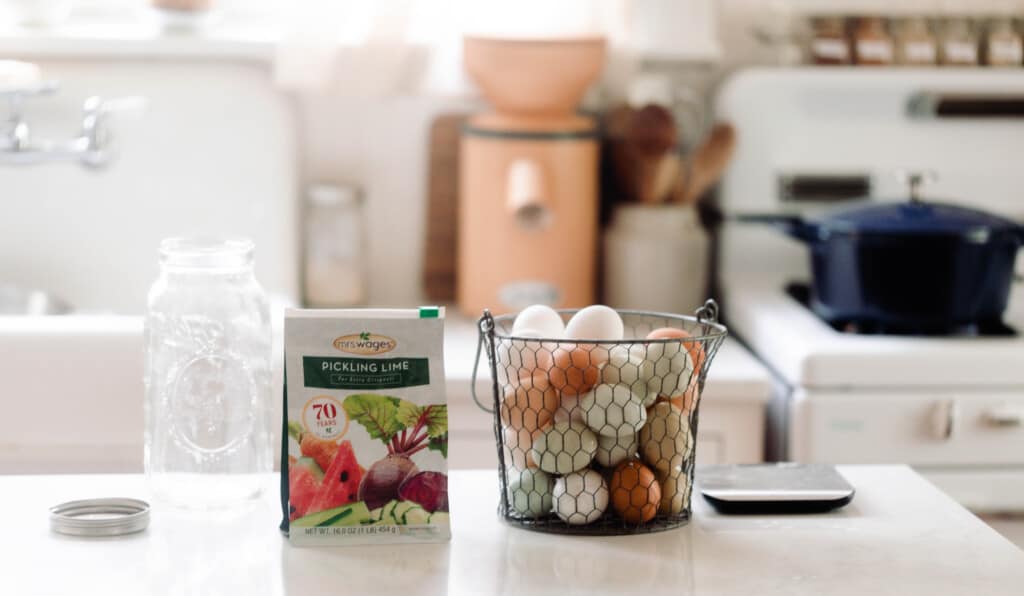
Equipment:
Airtight Food grade bucket or half gallon glass jar
Kitchen scale (to weigh the pickling lime)
What types of eggs can you use:
Chicken Eggs
Quail Eggs
Duck Eggs
Any eggs can we water glassed!
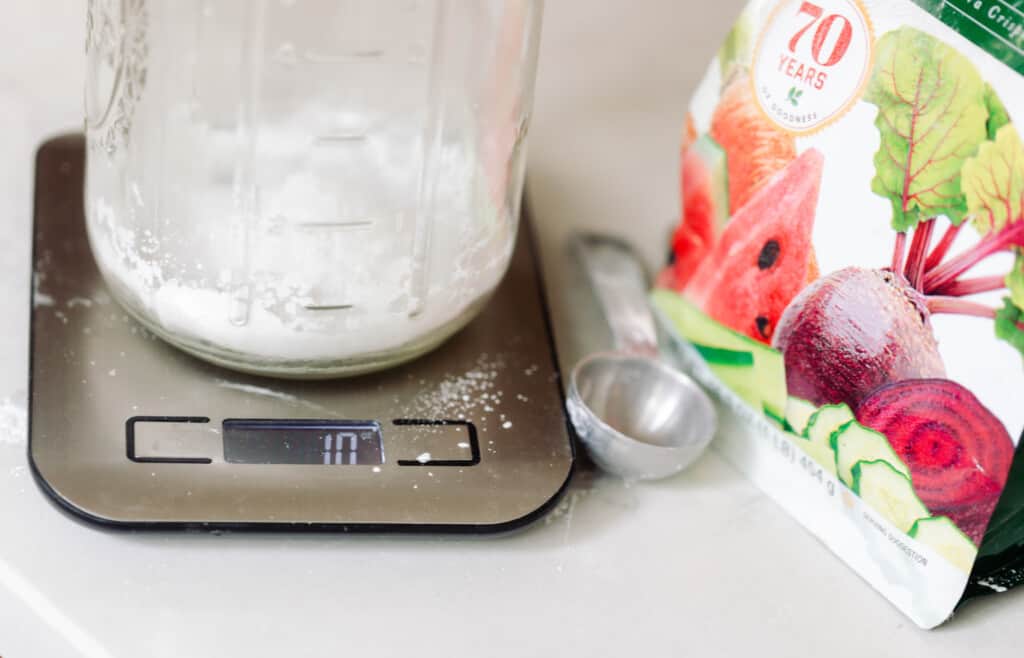
How To Water Glass Eggs:
Measure out 1 ounce of pickling lime on your kitchen scale.
Add the pickling lime to a clean half gallon jar and fill it up halfway (one quart) with filtered water.
Whisk the lime into the water until it is fully incorporated.
Carefully add the eggs pointy side down.
Add an airtight lid to prevent oxygen from getting in, and prevent the water from evaporating.
Store the water glassed eggs in a cool dark place.
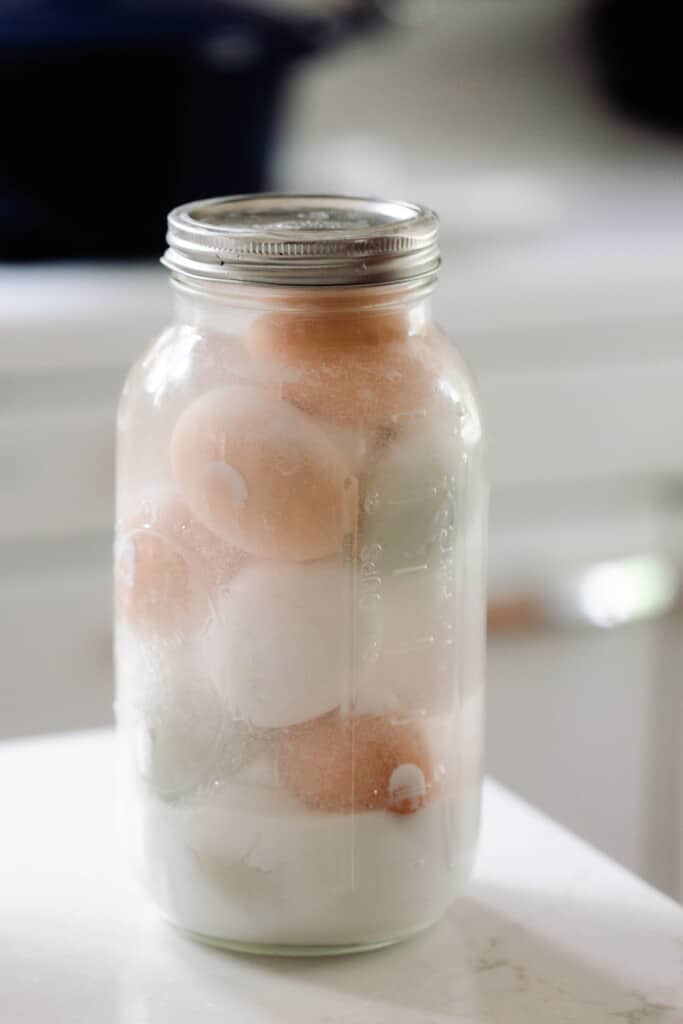
How Long Do They Last?
You can store water glassed eggs in a cool dark place for up to a year. Some people have had success for much longer.
Water Glassing Eggs
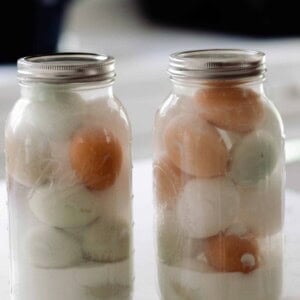
Ingredients
- 1 ounce pickling lime
- 1 quart filtered water
- Clean unwashed eggs, Eggs that have no poop or mud, and the “bloom” still fully intact
Instructions
- Measure out 1 ounce of pickling lime on your kitchen scale.
- Add the pickling lime to a clean half gallon jar and fill it up halfway (one quart) with filtered water.
- Whisk the lime into the water until it was fully incorporated.
- Carefully add the eggs pointy side down.
- Add an airtight lid to prevent oxygen from getting in, and prevent the water from evaporating.
- Store the water glassed eggs in a cool dark place.
Notes
- You can store water glassed eggs in a cool dark place for up to a year. Some people have had success for much longer.
Nutrition
Nutrition information is automatically calculated, so should only be used as an approximation.
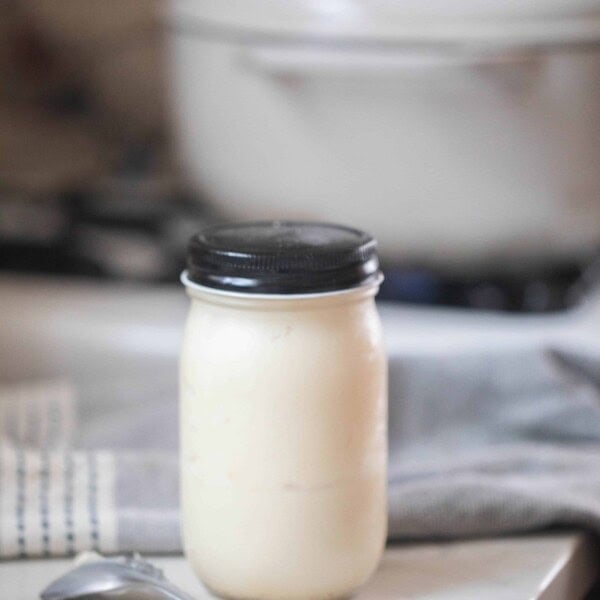
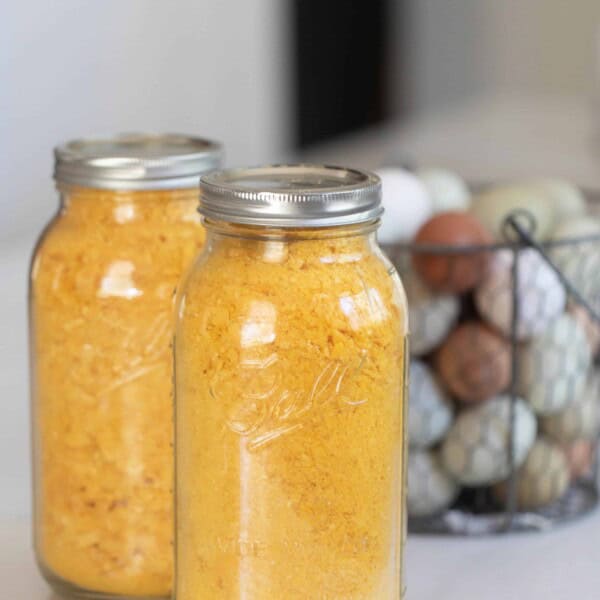
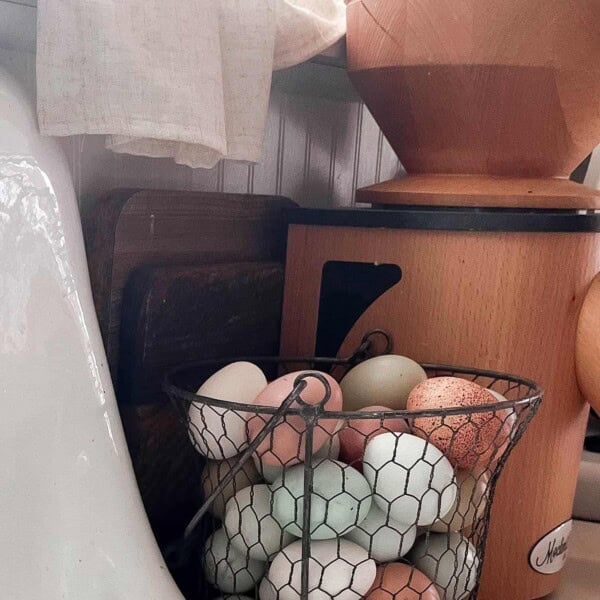
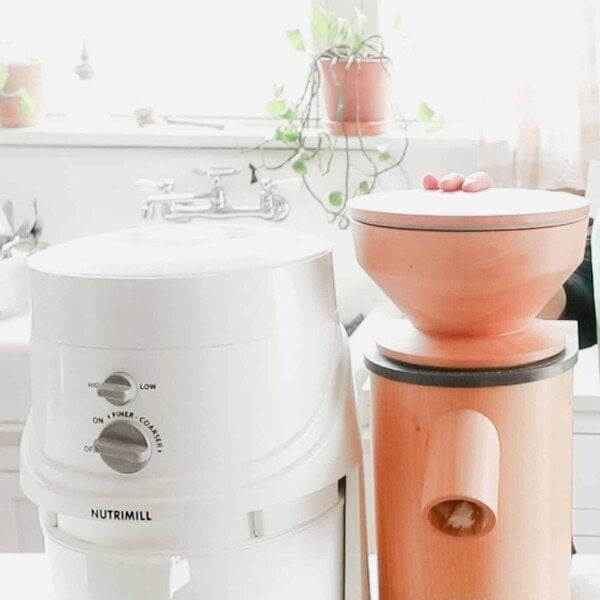






Can we we use eggs purchased from the store?
No, you cannot. The bloom (protective film) has already been washed off them, so it would not work.
If you live outside the USA, shop bought eggs aren’t washed so presumably the bloom will be intact and OK?
Yes. As long as the bloom is still intact, you can water glass them.
I can’t wait to try this! When you go to use your water glassed eggs, do you dump out all the lime water and put all the eggs back in a regular carton to keep in the fridge? Do you rinse them off before cracking them?
I like to rinse them off and put them in the fridge.
Do the top eggs need to be immersed in the solution or can the shell be above the solution line?
They need to be completely immersed.
I noticed that I had a cracked egg in the bottom of a gallon jar. Does this ruin the whole shower. The cracked egg was not leaking. I just saw the little tiny crack on it. This was my first attempt at glassing eggs. Also, I put all the eggs in the jar first, and then poured the lime water over them, I noticed you had in your recipe to put the eggs in the water. Does this make a difference?
It should be fine if they egg was not leaking. I would not use that egg in baking though. Just remove it and continue on.
I am using water glassed eggs that are almost 2 years old and they are GOOD!!!
I don’t wash them. Just wipe the poop off before putting them into the jar.
What happens if there was poop or dirt on the unwashed eggs that you missed when placing them in the solution? Does that make the whole batch stored bad? Can it make you sick? How do you get the poop and dirt off? Please answer soon before I have to start over. Thank you.
It can introduce bacteria into the other eggs. It’s super important to check your eggs thoroughly before putting them into the water.
I’ve heard/read that you should not wash eggs, so how do I wash them without going against that? And how do I wash the poop and mud and know that the bloom is still intact?
I try to just wipe them off really well with a towel.
Hi! Best thing to do is put a lot of fresh bedding in the nest, & change it frequently to keep the poop off!
Changing or replacing water? Is that necessary or a thing? And can we add to and continue to use same solution?
I like to change out my water to ensure I’m not introducing any bacteria.
How often would you do that?
How often do you change your water?
After I use all of the eggs from the jar!
I’m intrigued! I have so many eggs this year from new layers. My question is when you say to store in a cool room, how cool? I live in the desert and sometimes my house gets warm.
I’d say around 70. As long as you’re running your AC pretty frequently, it should be fine. You can also help by keeping them out of the sun etc. Anywhere they could draw extra heat, you should try to avoid.
We live on a well and have a water softener that we put salt in for rust. Would it hurt to water glass eggs with this softener?
I would use filtered water to be on the safe side.